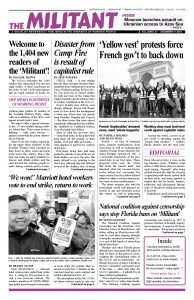Around the world, a mood of angry revolt is spreading among the “people from nowhere” — workers, family farmers and the rural poor, those who never have a voice in the big business press. Whether wage slaves or debt slaves, they are increasingly saying, “Enough!” after being pushed towards the edge for years by a rapacious profit-driven system built on their backs, and being ignored or treated like dirt by bosses, bankers, politicians and government bureaucrats of whichever ruling-class party is in power.
Exploding in small cities and towns in the rural areas and working-class suburbs of France, and onto the streets of Paris, the “yellow vest” movement is a powerful example of this rebellious sentiment.
Class contempt for the provincial “deplorables” oozes from every pore of the ruling families and wealthy professional layers and meritocrats who staff the capitalist rulers’ government. The protesters have defiantly hurled this back, calling themselves “les beaufs,” or “rednecks.”
The “green” taxes by French President Emmanuel Macron, which he has since suspended, were merely the spark that ignited tinder-dry deep-seated popular anger over the rulers’ unrelenting assaults on our livelihoods.
These workers say they don’t follow any of the bourgeois political parties or the top union officialdom — none have shown themselves to care one whit for what today’s deepening crisis of capitalism is doing to working people.
At the farmers’ demonstration in Quebec — a nationalist and protectionist action covered in this issue that was backed by the main union federations — protesters asked their Canadian rulers to use tariffs and other steps to hit the products of workers and farmers of other countries. But working-class internationalism is what is needed.
These actions pose the question of who will lead the countryside — the capitalist rulers or the working class?
The challenge is for working people to rebuild the labor movement — a bureaucratic shell of what it was in the past — to fight to win allies to the cause of the emancipation of the downtrodden majority. For the revolutionary vanguard of the working class, the challenge is to set the example, to act as tribunes of the people, raising demands that advance the interests of farmworkers, family farmers and other toilers in the countryside.
It is the working classes — including family farmers and other toilers — who work the products of nature to create all wealth, and are the guardians of all culture. Only in the custody of the working class can the environment be protected from the ravages of capitalism.
This is only possible if working people can win over today’s version of a peasants’ revolt to form an alliance to take political power out of the hands of the propertied rulers and use it to transform social relations — and ourselves — to build a society based on human need, not capitalist greed.

